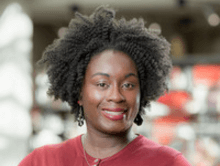Last Updated on July 9, 2022, 9:43 am ET

the interviewee
For Fair Use Week 2022, the Association of Research Libraries (ARL) teamed up with the Social Science Research Council (SSRC) #MediaWell project and asked experts to weigh in on how fair use supports research, news, and truth. Sandra Enimil, copyright librarian and contracting specialist at Yale University Library and chair of the Association of College and Research Libraries (ACRL) Research and Scholarly Environment Committee, explains below how the copyright environment affects research and scholarship, and why this matters for society.
Note: This post was transcribed from a conversation and lightly edited.
I am the chair of ACRL’s Research and Scholarly Environment Committee, and one of the things that we work on is talking about scholarship in academic institutions and how people make scholarship available and open access. In this landscape, I think one of the things that people recognize as important is author copyright. With faculty authors, at most institutions, the institution doesn’t claim copyright in their scholarly works, so the author keeps copyright.
But then, they in turn—in most instances for many, many years—they in turn would sign their copyright over to a publisher or a vendor to be published, which is a necessary requirement of the tenure process. Today, not as many publishers are asking for full copyright to publish scholarship. But, some still require copyright transfer, and faculty members still sign away their copyright. When faculty sign away their copyright, their work goes into publications that may or may not be accessible or open access. And unfortunately, more likely than not, it’s not open access. And then their library has to pay for access to the content created by their own faculty. Part of the work that I, and many other colleagues who are in similar positions across the country, have been thinking about is helping people understand what it means to keep their copyright.
Retaining copyright means an author has more options, they can make it open access, put it in an institutional repository, or otherwise share it. Trying to educate people about that has been one of the main priorities for folks like me—making sure people understand what retaining copyright means, that they need to read their agreements and understand what’s happening with their copyright. Even if they do plan to sign the agreement anyway, making sure that they understand what rights they may have given away. If they’ve signed a transfer, that means someone else owns the copyright. That means there may be some things that you think that you still should be able to do that maybe your agreement says you cannot.
I want to make sure people understand that the implications of copyright in publishing agreements is an important part of this realm. And I think the way that it impacts society is that scholarship, in many instances, is not available for the people that many scholars are trying to reach or not available to the people they’re trying to communicate with. Other scholars might not be able to access it if it’s not open access. Maybe the communities they might be studying or the communities their work might impact can’t access it because it’s not openly available. I think if we could get more folks thinking about that, being concerned about that, maybe we can try to get this environment to change a bit. I don’t mean to paint it so darkly, because there are some positive changes that are and have been happening.
There are faculty who want their work to be open access. But then we get into the cost of making things open access, and that is a whole other thing that’s all operating in the same sphere. I think it matters, because when people are publishing, even though there is that tenure and promotion that’s lingering in the background, they do want to be able to share their work. They want it to be available to as many people as possible because that’s how the scholarly environment is supposed to work. Your fellow scholars, your peers access the content and they challenge you on it, or they agree with you on it, or it helps support the work that they’re doing.
That’s the way we’re able to learn from one another and have advances in technology, in the humanities, in the social sciences, and all these different spaces, because of the way people are able to communicate and share scholarship. I think the environment that we exist in now means that not everything is being shared in such a way that encourages openness of communication and scholarship, across many different types of communities. And that doesn’t even get into the issues of equity with the global north and the global south and the ability of people to be able to access content and how difficult it can be for some communities to access research that they need to see, content they need to know and learn about.



